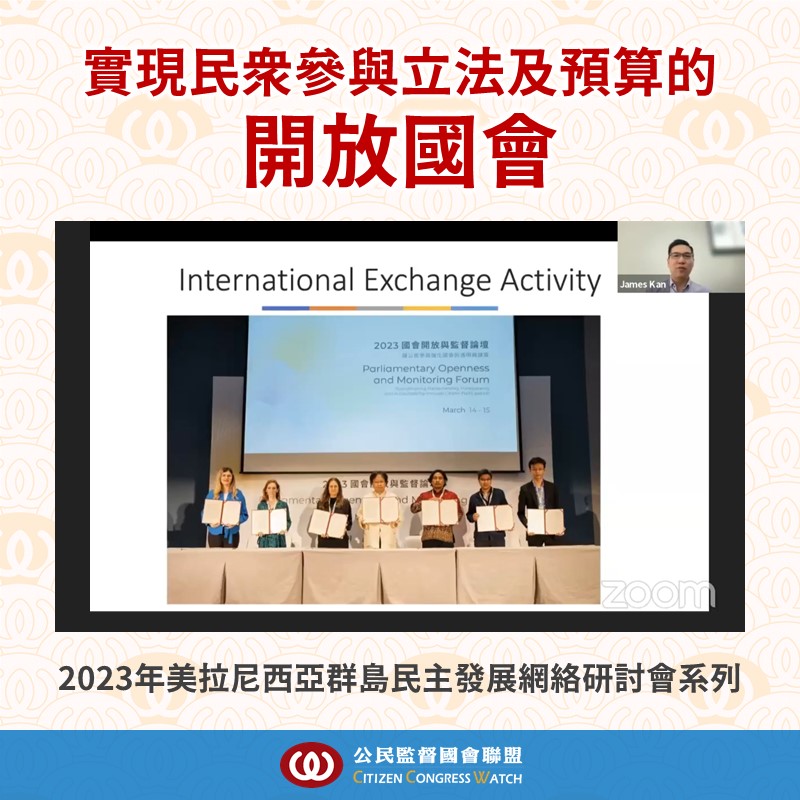【公督盟活動】實現民眾參與立法及預算的開放國會
發布時間 2023.07.11, AT 10:01 AM

公督盟副執行長甘順基受邀參與國際民主與選舉協助國際研究所(IDEA)主辦的「公民監督議會」的網路研討會。該會議除了邀請公督盟,另有斐濟公民憲法論壇(CCF)專案經理路易莎·拉吉萊武(Luisa Lagilevu)以及萬那杜非政府組織協會(VANGO)主席威廉·納薩克(William Nasak)。
做為研討會的第一位講者,副執行長介紹公督盟15年來評鑑立法委員的經驗,和倡議國會公開透明的過程。並且強調 #真正的民主是選舉後才開始。這個原則一直是公督盟的驅動力,致力於讓台灣的立法者對選民負責。除了重點監督國會外,CCW還致力於到學校推廣公民教育和國際組織串聯活動,推廣監督國會的重要性,以及公民參與政治的效能。也在參與者提問階段,分享台灣推動開放國會行動方案的歷程與近況。期望國會未來朝向結合監督與開放的概念,加入公民科技社群的力量,透過監督的經驗以及開放資料的運用,讓民眾可以更便利地參與立法以及國家預算審理的階段,成為真正的開放國會。
此外,公督盟原定於2023下半年開始進行「亞洲」監督國會串連的網絡,透過這次的分享,也期望大洋洲有興趣的公民團體可以一起加入,成為「亞太」監督國會串連的網絡,一起深化亞太地區的民主發展。
第二位發言者路易莎·拉吉萊武是斐濟公民憲法論壇(CCF)的專案經理。拉吉萊武女士向網路研討會的參與者介紹了CCF在2020年至2021年期間開展的議會專案。該專案的重點是向斐濟公眾和民間社會組織傳播議會資訊,教育議會常規秩序,並提供議會行事曆的資訊圖表。該專案還包括有關預算週期和起草預算提交的研討會,這些提交將提交給財政部的預算部門。拉吉萊武女士還提到了專案執行中的困難。首先,斐濟民間社會組織在質疑政府時會受到抵制,尤其是在COVID-19期間。此外,疫情使得專案的執行更加困難。總體而言,該專案的117名參與者對斐濟的議會程序有了更多的了解。
最後一位發言者威廉·納薩克是萬那杜非政府組織協會(VANGO)的主席。納薩克先生分享了VANGO的議會監督戰略計劃,計劃於2023年8月2日啟動。這一戰略計劃的主要目標是讓政府對通過的預算更加負責。在萬那杜,向公眾提供的預算資訊通常是過時的,公眾只有在預算在議會中通過後才會得知。VANGO將在監察長辦公室、審計長辦公室以及本地和區域專家的協助下,評估和製作有關政府支出的報告,以向公眾提供。
如果您想查看完整的演講,您可以在這裡找到錄影:https://www.facebook.com/InternationalIDEA/videos/1001426724625427
In the webinar hosted by the International Institute for Democracy and Electoral Assistance (IDEA), titled “Citizens Watching Parliament,” we heard from three experts in parliamentary monitoring: James Kan, Vice President of Citizen Congress Watch (CCW); Luisa Lagilevu, a Program Manager for the Citizens Constitutional Forum (CCF); and William Nasak, the chairman of the Vanuatu Association of NGOs (VANGO).
As Vice President of the CCW James Kan said, democracy begins after the votes are cast. This has always been the driving principle of the CCW as they seek to keep Taiwan’s legislators accountable to the citizens who elected them. Before the CCW was founded, negligence and dereliction of duty from legislators was common, with some not even attending the meetings they were responsible for. This was only made worse by the lack of public information of what happened in the legislature, which made it almost impossible for the average citizen to keep track of their legislators. This is why the CCW began to monitor legislators, evaluating their involvement in the legislative process and making the findings open to the public. This includes the easily understood categories of “outstanding” and “under observation” legislators, which allows citizens to easily keep track of exceptional legislators who have either exceeded or failed their duties. The CCW also evaluates the conduct of legislators more broadly, including qualitative evaluations sourced from the public. The attendance and participation rates for legislators have already increased since the CCW began, knowing that they will be held accountable for their actions. Beyond the core goal of monitoring the legislative Yuan, the CCW has also hosted events with legislators, schools, and international organizations, all with the common goal of spreading the importance of legislative monitoring and keeping citizens involved in politics.
During the Q&A session, the speaker also shared the progress and process of Taiwan's Open Parliament Action plan. It is hoped that the parliament will move towards integrating the concepts of monitoring and openness, harnessing the power of civic technology communities, and enabling the public to participate more easily in the legislative process and national budget reviews through the use of monitoring experience and open data, ultimately achieving a truly open parliament.
The second speaker, Luisa Lagilevu, is a Program Manager for the Citizens Constitutional Forum (CCF) of Fiji. Ms. Lagilevu provided the attendees of the webinar with insight into CCF’s recent parliamentary project from 2020 to 2021. This project was focused on disseminating parliamentary information to the Fijian public and civil society organizations, education on parliamentary standing orders, and infographics on the parliamentary calendar. This project also included workshops regarding budget cycles and drafting budget submissions, which were submitted to the budget division of the ministry of finance. Ms. Lagilevu also mentioned difficulties in conducting the project. Firstly, Fijian civil society organizations would receive pushback when questioning the government, especially during COVID-19. Additionally, the pandemic made the execution of the project more difficult. Overall, the 117 participants in the program became more aware of the Fijian parliamentary process.
The final speaker, William Nasak, is the chairman of the Vanuatu Association of NGOs (VANGO). Mr. Nasak shared details of VANGO’s strategic plan of parliamentary monitoring which is projected to launch on August 2, 2023. The primary goal of this strategic plan is to hold the government more accountable for the budget that it passes. In Vanuatu, information on the budget given to the public is often outdated, and the public is only made aware once the budget is already passed in parliament. With assistance from the ombudsman and the auditor general's office, as well as local and regional experts, VANGO seeks to evaluate and produce reports on government expenditure to provide to the public.
If you’d like to see the full speeches, you can find the recording here: https://www.facebook.com/InternationalIDEA/videos/1001426724625427